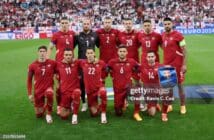Group E victors Sweden take on Ukraine at Hampden Park with both sides on the hunt for a place in the European Championship quarter-finals.
Sweden shocked many, finishing on seven points in their group via victories against both Poland and Slovakia and after enduring an uneventful 0-0 draw against Spain.
Finishing their three group matches with three points, Andriy Shevchenko’s Ukraine had to rely not only on Finland and Slovakia falling short against Belgium and Spain respectively but also their goal difference. Scraping it through by a single goal, Ukraine qualified for the Round of 16 as the final third-placed side from the group stages to progress.
Rather than viewing that as a negative, Shevchenko must galvanize his side and utilise the quality that he has within his squad and there is a good amount of it.
Oleksandr Zinchenko is arguably the biggest name within the Ukrainian ranks at the moment. The Manchester City left-back has been operating in central midfield for his nation and has displayed some eye-catching performances.
The 24-year-old’s quality is obvious and whilst he isn’t going to be a regular scorer for his side he acts almost like the ‘glue’ that holds it together, and his passing range is a quality that any side in this stage of the competition would value.
Andriy Yarmolenko and Ruslan Malinovskiy have also stood out for Shevchenko’s side, with the former netting twice in their first three games, including a stunning strike against the Netherlands. The 31-year-old wide man has struggled with fitness since joining West Ham United and is now proving just how valuable he can be.
Maliovskiy has yet to score for his side during the tournament, but his creative play in advanced areas has been exceptional, along with his dangerous set-piece deliveries.
Janne Andersson’s Sweden have worked cohesively as a unit thus far and showed quite differing qualities between each game. Most notably, the 3-2 victory in their most recent match against Poland saw a stark contrast in style compared to that of their first two games, where a more defensively resilient game plan saw them score just one goal, whilst keeping two clean sheets.
Emil Forsberg has been pivotal to his side’s success, featuring on the left of the midfield and scoring three times in as many matches.
The 29-year-old attacking midfielder has been a regular in the midfield for RB Leipzig in the past seven years and has scored 34 times for his club. A lot of Sweden’s success in the tournament will revolve around Forsberg, and that is evident by the fact that he has scored 75% of his team’s goals in the tournament so far.
Many eyes have been cast upon striker Alexander Isak, with plenty of speculation regarding his future. Whilst the 21-year-old is yet to score in the tournament, his performances have been impressive and it is certainly clear to see why clubs such as Arsenal are interested in the Swedish youngster.
Ukraine and Sweden haven’t met one another since 2012 when the latter fell short in a 2-1 defeat in Kyiv via a Shevchenko double. The now Ukraine manager scored a quickfire brace after Zlatan Ibrahimovic put Sweden ahead. Both sides finished on three points in Group D in that year’s European Championships.
Whilst some may view Ukraine as the weakest team due to their group positioning, they certainly cannot be counted out in this competition, as despite some disappointing results they have still shown strong character in their opening fixtures. Sweden must guard themselves against any complacency. No side in this stage of the competition can be underestimated and Shevchenko’s side are no different.
Follow us on Twitter @ProstInt
![Prost International [PINT]](https://prostinternational.com/wp-content/uploads/2021/08/PINTtFontLogoRoboto1536x78.jpg)


